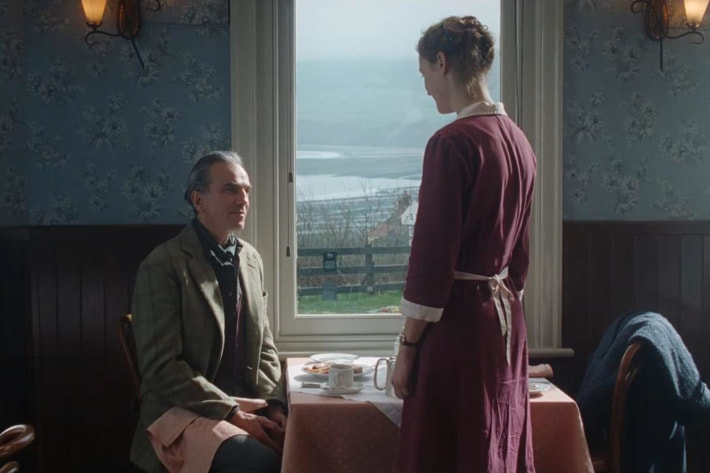For PTA, the idea to stage a film about a fashion maven is both counter-intuitive and perfectly in line with what he’s done before. Moving from grabby premises like the heyday of porn or a sideways telling of Scientology to a romance and a costume drama makes Phantom Thread the least compulsively-watchable of his films. As a skeptic of costume dramas in general, the anticipation for Phantom Thread was markedly less than what was sparked by the electric and goofy trailer for Inherent Vice. On closer look, in a year that also had a contemporary of PTA’s, Darren Aronofsky, interrogate his relationship to directing in mother!, Phantom Thread is almost predictable in how closely it aligns with PTA’s interests. The director and Reynolds share an attention to detail that fits so well as to be on the nose, but as Phantom Thread continues, more subtle similarities emerge. Reynolds might spend his morning primping and grooming until every hair is in place, but he’s not above vulgarity and rudeness, as is PTA. The character is an adult through and through, but he maintains a connection to his childhood through immature outbursts, much like PTA, the director who will surely one day make a straight comedy.
The relationship between the director’s mind and the events of Phantom Thread are most interestingly apparent in Reynolds’ relationship with Alma. She is being cast in a film from the moment that she stumbles on a dining chair and arouses his attention. He sizes her up and tests her wit before offering her a date that turns into an intrusive exercise in humiliation. Her role expands in his personal and his work life, and when she breaks out of the bubble that he’s formed for her, they clash. The specter of Cyril meeting with her alone and telling her to pack her things is always present. Reynolds is gradually revealed to have deep-seated issues with his mother, rendering him needy and bratty and in need of caretaking, such that Alma must put in the work to make him look good and smart and successful. It doesn’t take a keen eye, especially in the aftermath of Harvey Weinstein’s downfall and all it engendered, to see the comparison to an actress on a film set. The dawning realization of where Phantom Thread is going and what it rhymes with in contemporary life is one of the great thrills of taking it in.
It's not like Phantom Thread is lacking in other great joys. Day Lewis at work is one of them, and he hasn’t played a role this subdued since maybe The Boxer in the late 90’s. His Reynolds isn’t given to outbursts, but that doesn’t mean he’s lacking in the same all-consuming rage that Bill the Butcher so memorably demonstrated. Seeing Day Lewis, as Reynolds, scowl at someone loudly butter their toast is the equivalent to a knife in the kidneys. What was intimidating in Gangs of New York or There Will Be Blood is silly here, as Day Lewis allows himself to made into a figure of fun. The impulse for control is alluring when he’s seen combing his hair, but when it extends to other people, that impulse warps into childishness, a toddler demanding that everything be just so. Petulance is a new trick for Day Lewis, and it’s Reynold Woodcock’s middle name. In a beautiful touch in keeping with that characterization, Reynolds’ personal trademark is to sew something only he knows about into each dress, a little inside joke that gives him some bit of power over the wearer after they’ve concluded their business. It’s another auteurist jab at auteurists themselves, and another example of the levels that PTA and Day Lewis are operating on.
As predictably great as Day Lewis is, the combined might of Krieps and Manville overshadow him. The former is who the film belongs to, the innocent who enters into a strange new world and either bends it to her will or allows it to change her. Alma is something of a mystery, with her vague European accent and all her looks and asides. Krieps verbally withholds much of what she’s thinking, as she is an outsider of tenuous status, but she’s in so much control of her face and her body language that her concerns and motivations are decipherable. She should have a career like the modern masters of European cinema, women like Juliette Binoche or Isabelle Huppert. Her female counterpart within the House of Woodcock gets the most fun role in a film that finds space for humor amidst the ruffles and the pleats. Manville’s Cyril inhabits the role of an older sibling palpably and chillingly, such that the viewer is waiting for her to pin Reynolds to the ground and give him a wet willie. They’ve settled into a professional and symbiotic relationship, but that intimidation and intolerance of brattiness has been retained. It’s Cyril who knows her brother more than he knows himself, and she’s been able to sculpt him into the most successful self.
The list of superlatives could go on. Sound designer Christopher Scarabosio is doing yeoman’s work, ensuring that the aforementioned toast scraping will go down as the singular sound of the cinematic year. Another master not yet praised, Jonny Greenwood, does some of his best scoring work with PTA since There Will Be Blood, a thematic symphony of rising strings and plaintive piano keys as sumptuous as the costume design by Mark Bridges. As apparent as the greatness is, this is two PTA films in a row that lack the immediate power of his greatest hits. He’s getting subtler and deeper and more complex, but the exhilaration I’ve previously felt after his work wasn’t quite there with Phantom Thread. If Phantom Thread’s a victim of expectations, it’s gets the lightest of punishments. A-

 RSS Feed
RSS Feed